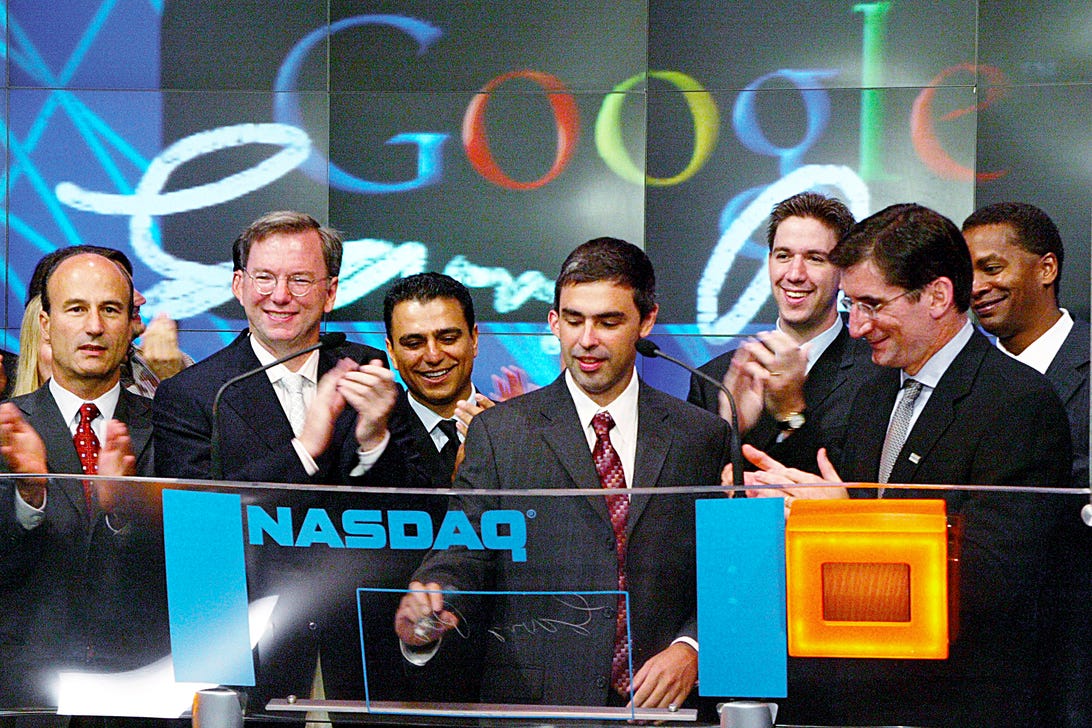‘Don’t be evil’: Google’s iconic mantra comes into question at labor trial
The ethos has set Google apart from other companies for decades. It’s under the spotlight again.
Last month, software engineer Kyle Dhillon said during a labor board trial that “Don’t be evil,” Google’s famous corporate mantra, had lured him to the tech giant five years ago.
The motto appealed to the Princeton grad because it showed Google was aware of its own power. It underscored, Dhillon said, the delicate work it takes to keep a big company like Google honest.
“Recognizing ‘Don’t be evil’ as one of its core values shows that it’s aware it’s possible for us to become evil,” Dhillon told a National Labor Relations Board attorney in response to a question about whether the motto played a role in his decision to join the search giant. “And it would be quite natural, in fact.”
The brief exhortation, which Google has deemphasized in recent years, is now a focal point in an NLRB complaint against the company that alleges the tech giant wrongly fired five employees for their labor activism. The employees had protested actions by Google, including its hiring of a consultancy with a history of anti-union efforts and its work with US Customs and Border Protection. Dhillon isn’t one of the fired employees, but he received a final warning from the company that the NLRB contends was illegal.
By untangling Google’s labor policies, the proceedings have shined a light on the tech giant’s famous work culture, which in turn has prompted a close look at Google’s iconic mantra. The result has been a public rumination on the company’s North Star set against the backdrop of a high-profile legal forum.
The tech giant has denied wrongdoing. The trial, which began on Aug. 23, is ongoing. One of the fired employees, Laurence Berland, has privately settled with the company.
Google isn’t alone in adopting an unorthodox mantra. Apple’s grammatically distinctive “Think different” advertising campaign was eventually embraced as a de facto corporate motto. Facebook’s former motto was “Move fast and break things,” an expression evoking permission — celebration even — of recklessness. Still, Google’s corporate motto has always been an outlier. It’s simultaneously tongue in cheek, befitting a company that pioneered freewheeling workplace culture with free food and slides in lobbies, yet powerfully solemn.

And so with it came a higher standard, said Irina Raicu, director of the Internet Ethics Program at Santa Clara University’s Markkula Center for Applied Ethics.
“It raised employee expectations that the company would be different,” Raicu said. “It invited a certain kind of employee to join.”
Google didn’t respond to a request for comment.
‘A jab at other companies’
Like any piece of great folklore, differing accounts of who coined “Don’t be evil” are told. But credit is usually given to Paul Buchheit and Amit Patel, two early Google employees. Buchheit, who created Gmail, has said he came up with the slogan during a meeting in early 2000 to define company values.
“I was sitting there trying to think of something that would be really different and not one of these usual ‘Strive for excellence’ type of statements,” Buchheit said in 2007. “It’s also a bit of a jab at a lot of the other companies, especially our competitors, who at the time, in our opinion, were kind of exploiting the users to some extent.”
After the meeting, Patel began writing the phrase on whiteboards around Google’s Mountain View, California, campus, trying to make the slogan stick. It did. The phrase eventually made it into Google’s code of conduct. It’s now one of the best-known corporate slogans in the world.
Buchheit and Patel didn’t respond to multiple requests for comment.”It raised employee expectations that the company would be different. It invited a certain kind of employee to join.”Irina Raicu, Santa Clara University’s Markkula Center for Applied Ethics
Since its inception, the motto has expanded from a guiding principle for product development and policies to a rallying cry for Google’s critics, some of the toughest being the company’s own workers. Employees say the mantra has served as the linchpin for some of the workforce’s most notable protests. That includes activism regarding now-shuttered plans for a censored Chinese search product, a contract with the Pentagon for tech that could improve the accuracy of drone strikes, and the company’s handling of sexual misconduct claims directed at senior executives. At some demonstrations, workers have held up signs that say “Don’t be evil.”
As Google has grown bigger and increasingly steeped in controversy, its dedication to the mantra has repeatedly come under question. Last week, The New York Times and The Guardian reported that Google knowingly underpaid temp workers, but decided not to fully correct the situation because it feared negative press attention. In response, Google workers wrote an open letter to leadership, including CEO Sundar Pichai, demanding the company fork over the $100 million in back pay it allegedly owes its temps.
“For much of Google’s workforce, ‘Don’t be evil’ is a smokescreen,” the letter says. “It’s a way to reap the financial rewards of unquestioning public faith, by assuring investors, users and government entities that Google is trustworthy and friendly — while successfully underpaying and mistreating the majority of their workers.”
‘It’s not enough not to be evil’
In 2004, as Google prepared to go public, co-founders Larry Page and Sergey Brin expounded on the motto in an interview with Playboy. The interview is excerpted in Google’s prospectus filing.
Brin: As for “Don’t be evil,” we have tried to define precisely what it means to be a force for good—always do the right, ethical thing. Ultimately, “Don’t be evil” seems the easiest way to summarize it.
Page: Apparently people like it better than “Be good.”
Brin: It’s not enough not to be evil. We also actively try to be good.
That attitude still resonates with Google’s rank and file today. At the labor board trial, Sophie Waldman, one of the employees who was allegedly wrongfully terminated, said it’s what attracted her to the company in the first place. “That was an important factor,” Waldman testified. “I’ve always cared a lot about making sure my work has a positive, or at the very worst, neutral impact on the world.”

Waldman said she kept the phrase in mind as she went on with her everyday work of trying to improve search results. Other employees also talked about the practical applications of the mantra, as opposed to just a pie-in-the-sky ideal.
“It made it sound like the company had somewhat of a conscience,” said Eddie Gryster, a Google software engineer. “It meant to me that at the time Google was basically saying, ‘Hey, that is good business for us to not be evil,’ and to do the right thing helps us maintain trust with users.”
Some people worry that Google, with its trillion-dollar valuation and headcount of more than 135,000 full-time employees, is moving away from that ethos. In 2015, after Page and Brin created Alphabet, a holding company for Google, the phrase was moved from the beginning of Google’s code of conduct to the end of it. Critics saw it as a demotion of the principle, an afterthought in the last sentence of a 6,500-word document. “And remember… don’t be evil, and if you see something that you think isn’t right – speak up!” the guidelines say.
The broader code of conduct for Alphabet makes no mention of the phrase.
The cynical view is that such a mantra is outdated in modern Silicon Valley, as the industry struggles to contain disinformation, election interference and other abuses. Still, Google employees have taken “Don’t be evil” to heart, as well as the last two words of the revised code of conduct: speak up. They did so by engaging in legally protected actions, the NLRB argues.
So, employees say, the mantra is at the core of why Google is on trial in the first place.
…
This article first appeared in www.cnet.com
Seeking to build and grow your brand using the force of consumer insight, strategic foresight, creative disruption and technology prowess? Talk to us at +971 50 6254340 or mail: engage@groupisd.com or visit www.groupisd.com/story

